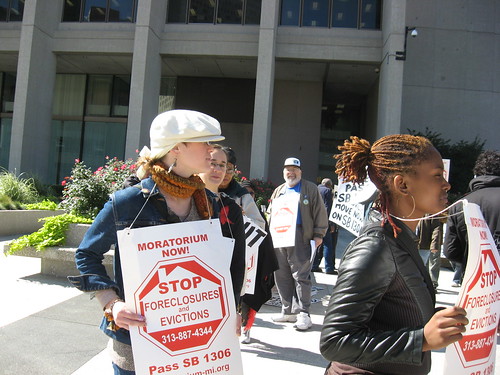
The Moratorium Now! Coalition to Stop Foreclosures and Evictions held a demonstration at the Federal Bldg. in downtown Detroit against the taxpayer bailout on Oct. 3, 2008. (Photo: Alan Pollock)., a photo by Pan-African News Wire File Photos on Flickr.
Why Lloyd hired criminal defense lawyer
By JOHN CRUDELE
Posted: 1:13 AM, August 23, 2011
What’s Lloyd Blankfein afraid of?
You can pick any number of things that could have caused the chairman and CEO of Goldman Sachs to go out and hire an expensive criminal defense attorney, but his most pressing concern has to be a guy named Rajat Gupta.
Gupta was a friend of Raj Rajaratnam, the founder of Galleon Group who is going to jail for insider trading.
Gupta was also an esteemed member of Goldman’s board of directors and would have been aware of anything important that was occurring at Goldman Sachs.
Phone conversations with Gupta that came up during Raj’s trial should have landed Gupta in a lot of trouble. The calls were enough to help convict Rajaratnam.
But Gupta has never been charged with criminal wrongdoing, which would lead any reasonable person to assume he’s cooperating with prosecutors on something.
What could that something be?
A lot of people think it’s Goldman’s selling of mortgage securities that it knew were less valuable than it was telling clients.
But that’s not the sort of thing that would have necessarily come up at a board meeting attended by Gupta.
And Goldman and Blankfein probably wouldn’t have broken ranks over something like this -- as hiring a private attorney implies.
My money is still on insider-trading charges.
Blankfein would have reported back to his board any information gleaned from his valuable contacts in Washington, especially at the Treasury Department when run by Blankfein’s predecessor Hank Paulson. And if that information was used for personal profit or to help Goldman earn money, then a crime was committed.
One thing is certain: You don’t take the money out of your own pocket for an attorney unless you think you really need one.
The center of the financial universe this week will be Jackson Hole, Wyo. That’s where the Kansas City Federal Reserve Bank holds its annual symposium and where on Friday at 10 a.m. Ben Bernanke will give a talk on the US economy.
Wall Street will be praying that Fed Chairman Bernanke will announce (or even hint) that he’s willing to do another round of quantitative easing, which is the printing of extra money so that the financial system doesn’t run out of liquidity.
QE -- as its friends call it -- was a dismal failure in versions 1 and 2. Banks had plenty of money to spread around but they didn’t. Instead, all that extra liquidity ended up being used for speculation. So, essentially, QE was the father of higher gasoline and other commodity prices.
But there are several problems with instituting another QE, even if Bernanke could realistically argue that it will work this time.
First, the previous two quantitative easings have become political issues.
Second, there are several members on the Fed’s policy making Open Market Committee who might gag at even the thought of printing more money.
Third, the rationale for the first two QEs was that they would keep interest rates low.
Well, rates are already at historic lows. So low, in fact, investors can’t get a reasonable return unless they are willing to gamble in the stock market.
Fourth, so that would make another QE look like a bailout of Wall Street, which certainly can use one. But that would give fuel to the politicians who want to be president. What! Helping Wall Street again! Even I can write that speech.
Finally, inflation is already worse than it was when QE 1 and 2 were instituted. You can see from the above item that inflation really isn’t as bad as it looks -- but looks count here. And pumping money even when inflation looks dangerously high is not a smart thing for the Fed.
So, my conclusion is: Bernanke might surprise us, but Wall Street is probably not going to get the quantitative easing it wants.
I’ve been telling readers for years that speculation in the oil markets has largely been responsible for drivers paying more at the pump.
And, as I explained, the speculation was being done by a wider group of people that included pension funds, university endowments and just about everyone else with a taste for risky investments and a desperate need for better returns.
Last Thursday, the Wall Street Journal put some numbers to the trend in a very nicely researched piece headlined “As Oil Spiked, Many Traded.”
This should put to rest the preposterous notion that oil prices were climbing because of mysteriously huge demand coming from some part of the world where the economy is somehow doing well.
Nope. Just as I and my sources have said: speculators (in the broadest sense of the word) caused prices to climb these past few years.
Now maybe the pests who’ve been sending me nasty e-mails will go away.
jcrudele@nypost.com
Read more: http://www.nypost.com/p/news/business/why_lloyd_hired_criminal_defense_f8MLntuQ164unriOU0Aq1L#ixzz1VpXyYCe2
No comments:
Post a Comment